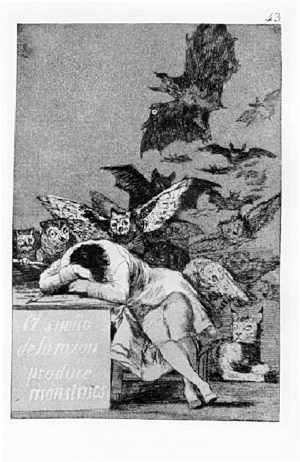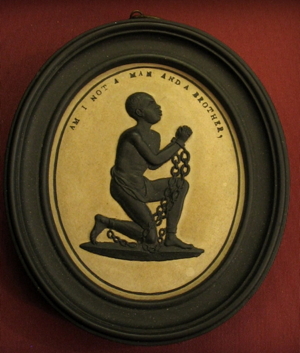 |
 |
| Francisco Goya, “The Sleep of Reason produces Monsters” | Abolitionist Medallion – “Am I not a Man and Brother?” |
I have put online some old teaching material (both lecture notes and Seminar Reading Guides) I wrote decades ago when I was working in the Department of History at the University of Adelaide. I wanted to show the students the importance of the “liberal” critique of the privileges and injustices of the old regime (both 18th and 19th centuries) and how liberal revolutionaries and reformers went about “emancipating” ordinary people from these infringements on their lives and liberties, with varying degrees of success. That is, the liberal reformers of the day, as well as me trying to show Australian students in the 1980s and 1990s that liberal ideas were important!
These courses were offered at introductory first year level (in a variety of “modules” in team taught subjects), to 2nd and 3rd year level students in a full year course, and then at the Honors (4th year) level in a semester length subject.
Although I didn’t have an opportunity to do so at the time, I had in mind a coherent and interconnected set of lectures and seminars on “The Great Emancipations” which transformed Europe (and indeed “western civilisation”) in the late 18th and 19th centuries and made possible the emergence of the modern market and liberal order we have today (or at least partly). These lectures would combine the history of ideas (liberal political and economic theory) and the political and social history of the liberal movements which put these ideas into practice. For example the ideas of free markets and free trade in the work of Adam Smith and Turgot in the 1760s and 1770s and the free trade movements which emerged in England and France in the 1840s and 1850s.
The courses I gave were:
- The Enlightenment – Reading Guide
- The Old Regime and the Enlightenment – Reading Guide and Lecture Notes
- Liberal Europe and Social Change 1815-1914 – Reading Guide and Lecture Notes
- Europe in the Long 19th Century 1789-1918 – Reading Guide and Lecture Notes
And the ideas/movements I covered were:
The Enlightenment:
- Power and Privilege in the Old Regime
- The Enlightened Critique of the Old Regime
- The Codification and Transmission of the Enlightenment: Denis Diderot and the Encyclopédie (1751).
- Rousseau on Freedom and Inequality: Jean-Jacques Rousseau, A Discourse on Inequality (1754).
- The Attack on Religion: Voltaire, Philosophical Dictionary (1764).
- Reform of the Law and Punishment: Beccaria, On Crimes and Punishment (1764).
- Opposition to Slavery and Colonialism: Abbé Raynal, Philosophical History of the Two Indies (1772).
- Commerce and Liberty: Adam Smith, The Weath of Nations (1776)
- The Enlightenment in Drama and Opera: Beaumarchais’ and Mozart’s The Marriage of Figaro (1778, 1786).
- The rights of women: Mary Wollstonecraft, A Vindication of the Rights of Women (1792)
- Progress and the Vision of an Enlightened Future: Condorcet, Sketch for a Historical Picture of the Progress of the Human Mind (1793).
- Criticism of the Ancien Régime in Art: Francisco Goya, Los Caprichos (1799).
- Reform and Revolution: Putting the Ideas of the Enlightenment into Practice
19th Century Europe
- Competing Visions of Freedom & Reform: Mill’s Liberalism vs Marx’s Socialism
- Liberal Ideas
- Individualism and Liberty
- Utilitarianism Vs. Natural Rights
- Property and Contract
- The Free Market and Social Harmony
- Limited vs. No Government
- Constitutionalism and the Rule of Law
- Democracy and Electoral Reform
- Freedom of Speech
- Liberal Critiques
- The Rituals & Imagery of Political Power: Republicanism vs Monarchism
- Poverty
- War and Empire
- Centralisation of Government Power
- Socialism
- The New Class Society
- Liberal Reforms
- The Abolition of Serfdom & Slavery
- Free Trade
- Electoral Reform (men)
- Deregulation of Industry
- The Emancipation of Women
- Other matters of concern and dispute
- The National Question
- Classical Political Economy and Laissez-faire
- Manufacturing and the Machinery Question
- Population Growth and Malthusianism
- The Social Question. Poverty and Progress
- Liberal Politics in the Novel
- Alessandro Manzoni, The Betrothed (1827)
- Stendhal, The Red and the Black: A Chronicle of the 19th Century (1830)
- George Eliot, Felix Holt, The Radical (1866)
- Jules Verne, 20,000 Leagues Under the Sea (1870
- Theodor Fontane, Effi Briest (1895)
